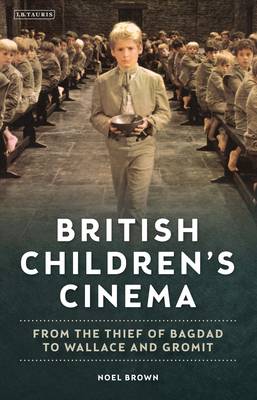
- Afhalen na 1 uur in een winkel met voorraad
- Gratis thuislevering in België vanaf € 30
- Ruim aanbod met 7 miljoen producten
- Afhalen na 1 uur in een winkel met voorraad
- Gratis thuislevering in België vanaf € 30
- Ruim aanbod met 7 miljoen producten
Zoeken
€ 72,95
+ 145 punten
Uitvoering
Omschrijving
British children's films have played a part in the childhoods of generations of young people around the world for over a century. Until now, however, their cherished status has remained largely unexplored. In this book, Noel Brown relates the history of children's cinema in Britain from the early years of commercial cinema to the present day, to reveal the reasons behind its acclaim in international popular culture.Drawing on multiple sources, Brown provides in-depth analysis of a range of iconic films, including The Railway Children, The Thief of Bagdad, Bugsy Malone, the Harry Potter films, Mary Poppins, Nanny McPhee, Paddington, Oliver!, and Aardman's Wallace and Gromit series. Futhermore, he investigates industrial and commercial contexts, such as the role of the Children's Film Foundation; and includes revealing insights on changing social and cultural norms, such as the once-sacred tradition of Saturday morning cinema. Brown challenges common prejudices that children's films are inherently shallow or simplistic, revealing the often complex strategies that underpin their enduring appeal to audiences of all ages and backgrounds.In addition, he shows how the films allow a privileged access to historic cultures and the nation's political past.
In doing so, Brown firmly establishes children's cinema as an important genre not only for students and scholars of film studies but also for those interested in socio-cultural history, the production and reception of popular entertainment and anyone looking for entertainment, escapism and nostalgia.
In doing so, Brown firmly establishes children's cinema as an important genre not only for students and scholars of film studies but also for those interested in socio-cultural history, the production and reception of popular entertainment and anyone looking for entertainment, escapism and nostalgia.
Specificaties
Betrokkenen
- Auteur(s):
- Uitgeverij:
Inhoud
- Aantal bladzijden:
- 320
- Taal:
- Engels
- Reeks:
Eigenschappen
- Productcode (EAN):
- 9781350242876
- Verschijningsdatum:
- 29/07/2021
- Uitvoering:
- Paperback
- Formaat:
- Trade paperback (VS)
- Afmetingen:
- 140 mm x 216 mm
- Gewicht:
- 371 g

Alleen bij Standaard Boekhandel
+ 145 punten op je klantenkaart van Standaard Boekhandel
Beoordelingen
We publiceren alleen reviews die voldoen aan de voorwaarden voor reviews. Bekijk onze voorwaarden voor reviews.








